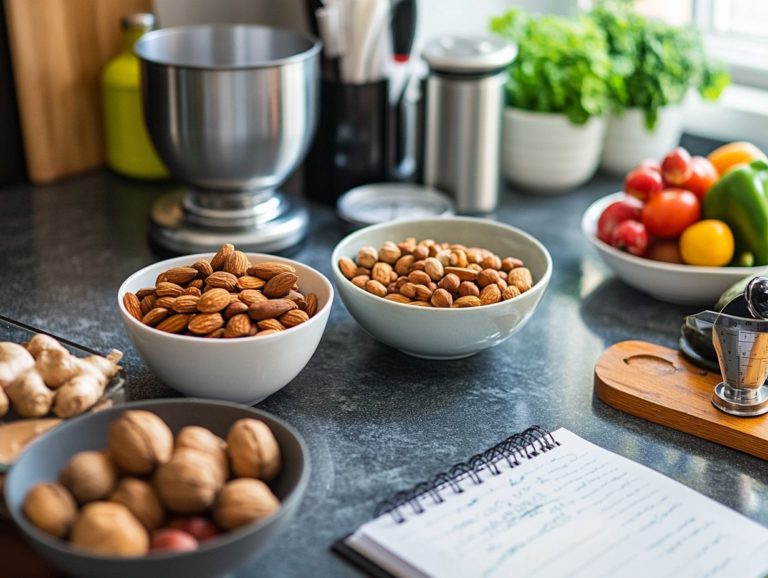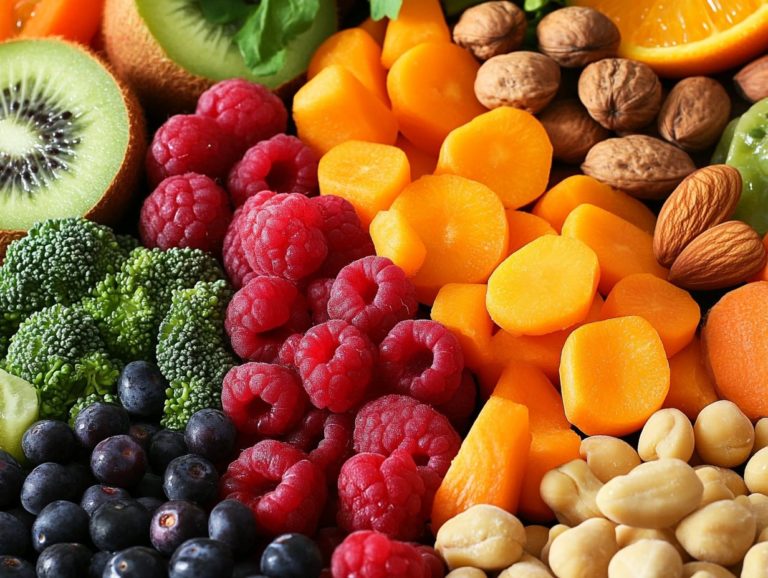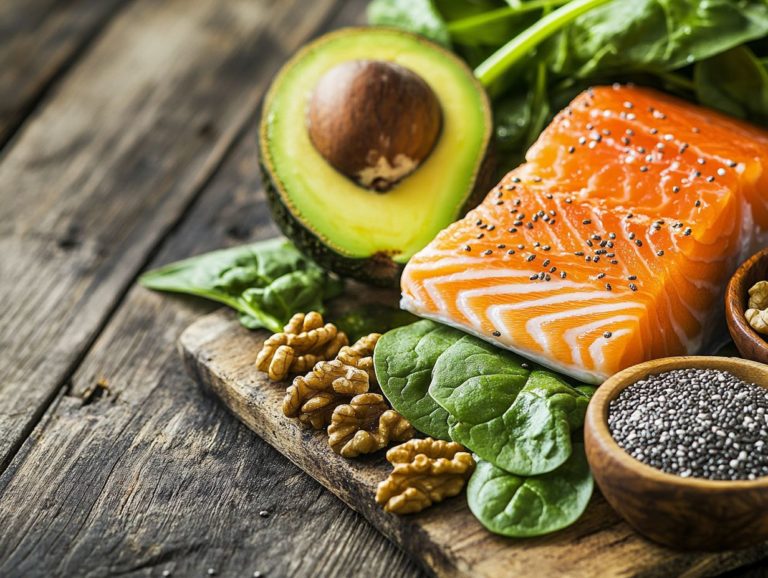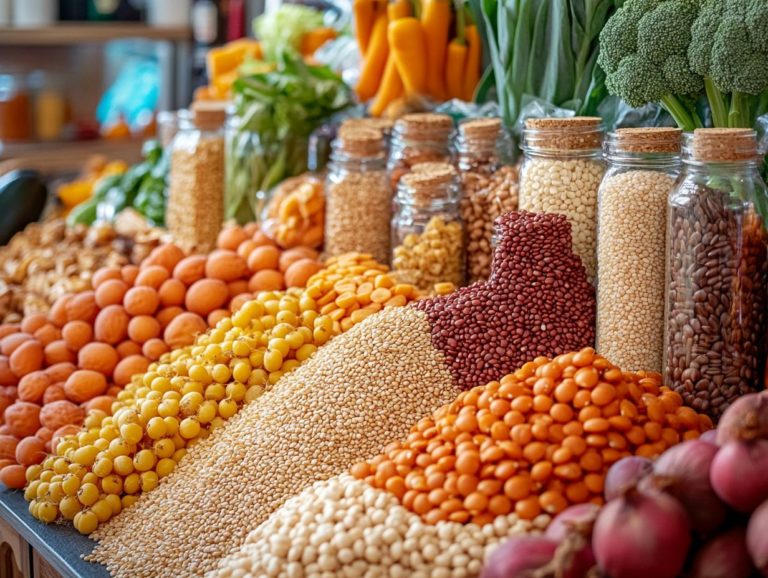How to Build a Balanced Grocery List for Health
Creating a balanced grocery list is vital for maintaining your healthy lifestyle, ensuring that your meals are not only nutritious but also satisfying.
This article delves into the significance of macronutrients nutrients that provide energy and are essential for health and how they align with your body s needs. You ll discover the benefits of choosing whole foods and practical tips for seamlessly incorporating fruits, vegetables, lean proteins, and healthy fats into your diet.
Plus, you ll learn how to plan balanced meals without straining your budget.
Get excited to transform your grocery shopping into a health-enhancing adventure!
Contents
- Key Takeaways:
- Why a Balanced Grocery List is Important
- Understanding Macronutrients
- Choosing Whole Foods for a Balanced Diet
- Tips for Creating a Balanced Grocery List
- Meal Planning with a Balanced Grocery List
- Staying Within Budget
- Frequently Asked Questions
- What does it mean to build a balanced grocery list for health?
- Why is it important to have a balanced grocery list for health?
- How do I start building a balanced grocery list for health?
- What are some tips for building a balanced grocery list on a budget?
- How can I make sure my grocery list is balanced for my specific dietary needs?
- What are some examples of foods I should include in my balanced grocery list for health?
Key Takeaways:

- A balanced grocery list is essential for your health.
- Learn to include macronutrients like fruits, vegetables, and lean proteins.
- Plan meals to maintain a budget while eating well.
Why a Balanced Grocery List is Important
A balanced grocery list is crucial for sustaining a healthy diet, enabling you to prioritize nutritious options such as fresh fruits, vibrant vegetables, lean meats, and whole grains, all while effectively managing your grocery budget.
By planning your meals in advance and selecting wholesome foods, you must ensure a diverse diet that meets your nutritional needs and streamlines your shopping experience.
The Good Housekeeping Institute underscores the significance of these lists in fostering healthy eating habits, helping you avoid impulsive purchases that typically lack nutritional value.
Understanding Macronutrients
Grasping the concept of macronutrients is essential for attaining a balanced diet. These nutrients proteins, carbohydrates, and fats are the cornerstones of your body s functionality, each contributing uniquely to your overall health and well-being.
Research from the Department of Nutritional Sciences at Pennsylvania State University reveals that understanding the optimal balance of these macronutrients can significantly influence your energy levels, facilitate muscle repair, and aid in effective weight management.
What are Macronutrients and Why Do We Need Them?
Macronutrients are essential pillars of a healthy diet, comprising proteins, carbohydrates, and fats each playing a crucial role in providing the energy and nutrients your body needs for optimal function and growth. It s important to source these macronutrients from whole foods, ensuring they remain nutritionally rich and genuinely beneficial for your health.
Understanding the role of each macronutrient is key. Proteins support muscle repair and cellular function, carbohydrates act as your primary energy source, and fats are vital for hormone production and nutrient absorption. When you choose whole foods, you not only gain maximum health benefits but also reduce your exposure to the toxins and additives often lurking in processed items.
By prioritizing high-quality sources, you pave the way for better overall wellness. Nutrient-dense foods can enhance digestion, boost your energy levels, and strengthen your immune system, making them essential in any balanced dietary approach.
Choosing Whole Foods for a Balanced Diet
Choosing whole foods is essential for maintaining a balanced diet. These minimally processed options are brimming with vital nutrients, including vitamins, minerals, and fiber, all of which contribute to your overall health and well-being.
You should prioritize fresh vegetables, seasonal fruits, whole grains, and legumes, while also incorporating low-fat, high-protein options into your meals. This approach allows you to create dishes that are not only nutritious but also wonderfully satisfying.
Now is the time to take action! Start creating your balanced grocery list today, and share your journey towards healthier eating!
Benefits of Whole Foods

Whole foods offer a wealth of health benefits. They are packed with natural nutrients, high fiber, and antioxidants that work together to combat diseases and elevate your overall wellness. By incorporating these foods into your daily meals, you ll feel amazing and boost your energy levels.
Choosing a diet rich in whole foods often leads to improved digestion. The fiber in these foods promotes regular bowel movements and supports a healthy gut microbiome. These foods rich in nutrients play a crucial role in preventing diseases, lowering your risk of chronic conditions like heart disease and diabetes.
Incorporating foods like leafy greens, whole grains, nuts, and vibrant fruits not only sustains your energy but also contributes to mental clarity and mood stability. Prioritizing these nutrient sources sets the stage for a more vibrant and healthful lifestyle.
Tips for Creating a Balanced Grocery List
Making a balanced grocery list helps you shop better. This ensures you acquire the right ingredients for a nutritious diet while remaining mindful of your budget.
By planning ahead, embracing seasonal produce, and using coupons, you can optimize savings while keeping your pantry stocked with essential staples.
Incorporating Fruits and Vegetables
Including a variety of fruits and vegetables in your grocery list is essential for creating balanced meals. These vibrant foods are rich in nutrients, vitamins, and minerals that support your health. Choosing seasonal produce ensures freshness while enhancing the nutritional value and flavor of your dishes.
To elevate the nutritional quality of your meals, consider exploring local farmers’ markets or community-supported agriculture (CSA) programs. These allow you to buy fresh produce directly from local farms, inspiring your culinary adventures.
When planning your meals, think about color. The more colorful your plate, the broader the range of nutrients you re inviting in. Integrating seasonal fruits and vegetables encourages creativity in the kitchen, leading to exciting new recipes and flavor combinations.
Embracing a diverse array of produce significantly enhances your meal satisfaction and contributes to a healthier lifestyle.
Choosing Lean Proteins
Selecting lean protein sources like skinless chicken, wild salmon, and plant-based options is essential for a balanced diet. These provide the necessary building blocks of proteins without excessive saturated fats. Lean proteins support muscle growth and help you feel full and satisfied during meals.
Incorporating various lean proteins strengthens your health. Consider sources like legumes, tofu, and quinoa for plant-based alternatives rich in fiber and essential nutrients. Fish like cod or tilapia are excellent low-fat choices, packed with omega-3 fatty acids.
These proteins help repair tissues effectively and maintain a robust immune system. They also assist in regulating hormones and supporting metabolic functions, making them vital for anyone looking to sustain energy levels throughout the day. Finding the right balance of proteins is key to maximizing their health benefits.
Start your journey to better health today by filling your grocery list with vibrant fruits and vegetables!
Including Healthy Fats
Including healthy fats in your grocery list think olive oil, avocados, and nuts is crucial for maintaining a balanced diet. These fats offer important fats your body needs that support heart health and overall wellness.
Plus, they elevate the flavor and nutritional quality of your meals, making every bite more satisfying. Transform your meals by adding these healthy fats! For instance, drizzling olive oil over salads not only enhances the taste but also aids in the absorption of fat-soluble vitamins, turning a mundane dish into something extraordinary.
You can easily spread avocados on whole grain toast for breakfast or blend them into smoothies for a creamy texture packed with healthy monounsaturated fats. Don t underestimate the power of nuts; a sprinkle over yogurt or oatmeal adds a satisfying crunch while delivering vital nutrients. Incorporating these healthy fats into your meals elevates both enjoyment and nutritional value, transforming your dining experience into something truly enriching.
Meal Planning with a Balanced Grocery List

Effective meal planning, accompanied by a thoughtfully crafted grocery list, serves as a time-saving strategy that gives you the power to prepare nutritious meals effortlessly throughout the week.
By organizing your meals in advance and shopping purposefully, you can curate a diverse menu tailored to your dietary needs and preferences, elevating your culinary experience and enhancing your overall well-being.
Creating Balanced Meals and Snacks
Creating balanced meals and snacks involves a thoughtful combination of various food components, ensuring each meal is rich in protein, fiber, and healthy fats. This strategy provides sustained energy and enhances your satisfaction, allowing you to maintain a nutritious diet that effectively fuels your body.
To achieve this, begin with a reliable protein source, which includes lean meats, beans, or tofu. Pair these with whole grains like quinoa or brown rice, which contribute fiber and support your digestive health. Incorporating a vibrant array of vegetables can significantly boost the nutrient density of your meals, while adding a healthy fat, such as avocado or olive oil, introduces richness and promotes lasting fullness.
For snacks, consider blending Greek yogurt with berries or pairing hummus with sliced veggies. These nutrient-dense options will help keep your energy levels steady throughout the day, ensuring you remain at your best.
Staying Within Budget
Staying within your budget while grocery shopping necessitates a blend of strategic planning and resourcefulness. By utilizing tools like coupons and opting for seasonal produce, you can discover affordable options that don t compromise on nutritional quality.
This mindful approach enables you to make healthy choices while maintaining control over your finances.
Tips for Affordable and Nutritious Options
Finding affordable and nutritious options while grocery shopping is entirely within your reach through thoughtful meal planning and selecting versatile ingredients that can shine in various dishes. By prioritizing whole foods, seasonal produce, and strategic shopping, you can maximize both nutrition and savings.
Creating a weekly meal plan incorporating these ingredients ensures that nothing goes to waste and streamlines your grocery list. By focusing on meals that share similar components, you can buy in bulk and take advantage of discounts.
Explore local farmer s markets or join a community-supported agriculture program for fresher and more cost-effective produce options.
Leveraging digital tools and apps for grocery budgeting can make tracking your expenses a breeze. This way, you can keep your eye on health without overspending, making nutritious eating a sustainable and enjoyable lifestyle choice.
Frequently Asked Questions
What does it mean to build a balanced grocery list for health?

A balanced grocery list includes a variety of foods. These foods provide important nutrients and support a healthy lifestyle.
Why is it important to have a balanced grocery list for health?
A balanced grocery list helps you get necessary vitamins, minerals, and nutrients for your body. This ensures your body functions properly and stays healthy.
How do I start building a balanced grocery list for health?
Begin by planning your weekly meals. Make a list of the ingredients you need and focus on including fruits, vegetables, lean proteins, whole grains, and healthy fats.
What are some tips for building a balanced grocery list on a budget?
To create a balanced grocery list on a budget, look for sales on fruits and vegetables. Choose frozen or canned options and buy in bulk for longer-lasting items.
How can I make sure my grocery list is balanced for my specific dietary needs?
If you have specific dietary needs, consult a healthcare professional or registered dietitian. They can guide you on what foods to include and suggest portion sizes.
What are some examples of foods I should include in my balanced grocery list for health?
Include leafy greens, lean proteins (like chicken and fish), whole grain bread and pasta, nuts, seeds, and a variety of fresh fruits and vegetables.






